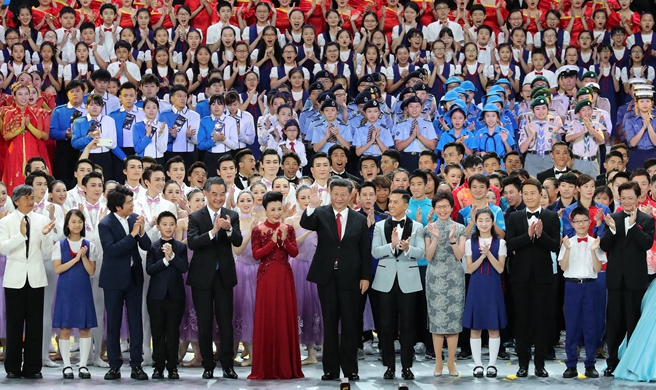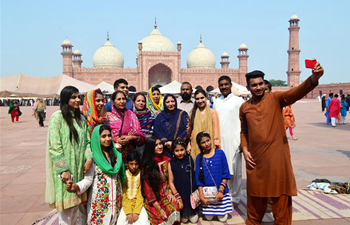BERLIN, June 30 (Xinhua) -- The German Federal Parliament (Bundestag) approved the same-sex marriage in an historic vote on Friday.
"This is an historic day. Not just for lesbians and gays, but also for a more just and democratic society. Whether or not one has the right to marry in Germany is no longer determined by gender, but instead by love, solidarity and the promise to support one another in good times and bad," the German Association of Lesbians and Gays (LSVD) told Xinhua when asked for comment.
A majority of 393 out of 623 parliamentarians approved the motion "marriage for all" which was launched by the Social Democrats (SPD), Liberal Democrats (FDP), Greens (Gruene) and Left party (Linke).
The bill received cross-bench support, including from members of Chancellor Angela Merkel's conservative Christian Democratic Union (CDU).
Merkel voted against marriage equality, she told press after the event.
Early into the parliamentary session on Friday, SPD, LPD, Greens and the Left party had narrowly passed changes to the legislative schedule to allow for a vote on marriage equality. A total of 38 minutes were allocated for related debate.
"That we are making a decision today may not be good for the coalition, but it is good for the people," head of the SPD faction Thomas Opperman said as he took the floor. The comments were in reference to the tensions caused by the vote between the governing coalition partners SPD and the CDU-Christian Social Union (CSU).
Green parliamentarian Volker Beck, who dedicated much of his life to campaigning for LGBT rights, was visibly moved as he witnessed the vote on his last day in parliament.
"The age of tolerance is over, the age of acceptance has come," he stated.
Green party faction leader Katrin Goering-Eckardt congratulated Beck for his long-standing efforts and described the vote as his "life's work."
Head of the CDU faction, Volker Kauder said there were "different perspectives" on the issue but emphasized his respect for both sides. Kauder said he viewed marriage as the union of man and wife but also acknowledged that as a Christian, one could arrive at a new opinion.
In contrast, CDU parliamentarian Jan-Marco Luczak had urged his own faction that "the time for the opening of marriage has arrived today."
Speaking against the motion, CSU politician Gerda Hasselfeldt insisted that registered civil partnerships for homosexuals were of "equal value" but not "identical" to marriage. Marriage remained the foundation for family she said.
Friday's vote marked the culmination of a week of heated political debate, which was prompted by a surprising U-turn made by Angela Merkel on the subject of marriage equality.
Speaking to the women's magazine Brigitte, Merkel had unexpectedly swerved from her party's official line to oppose same-sex marriage on the grounds of child welfare. Instead she said she could envision a "decision of conscience," granting parliamentarians a free vote during the next legislative period.
The SPD interpreted Merkel's words as having released the party from the coalition pact not to raise the issue while in government with the CDU/CSU and quickly called for an immediate vote.
The development sparked outrage and bitter infighting amongst German conservatives, some of which accused Merkel of having overwhelmed her fellow party members with a unilateral decision.
CDU politician Johannes Singhammer warned against a subsequent granting of equal adoption rights to homosexuals, voicing the opinion that "children need a mother and a father."
Several conservative politicians also complained that the issue was being rushed through parliament and raised questions over the constitutionality of such legislation.
CDU legal counsel Hans-Peter Uhl told the newspaper Passauer Neue Presse that marriage equality was "not compatible with our constitution."
"The federal constitutional court attaches two conditions to marriage: It is a lasting community of responsibility and it is geared towards producing children. This can only occur with a man and a woman," Uhl said.
Such concerns were rejected by Federal Justice Minister Heiko Maas (SPD). Maas saw no need for a constitutional change and explained in Bild newspaper that there was "...a transformation of the traditional understanding of marriage which, given the creative freedom of lawmakers, constitutionally enables the introduction of marriage for all."
"Our law must be the same for all," Maas said.
Merkel's decision to vote against the bill, despite expressing confidence in the parenting abilities of homosexuals in the Brigitte interview, may be read as an attempt to appease critical voices amongst Germany's conservatives.
When asked to explain her opposition to the bill, the Chancellor responded that she interpreted marriage as defined in the German constitution as being between "a man and a woman."
She claimed that questions over adoption rights did not play a role in her decision making and affirmed the belief that homosexuals should receive equal legal standing to heterosexuals when it came to adoption.
Friday is the last ordinary session before the current Federal Parliament dissolves. A new German assembly will be formed following a two-month summer break in July and August and national elections in September.

















